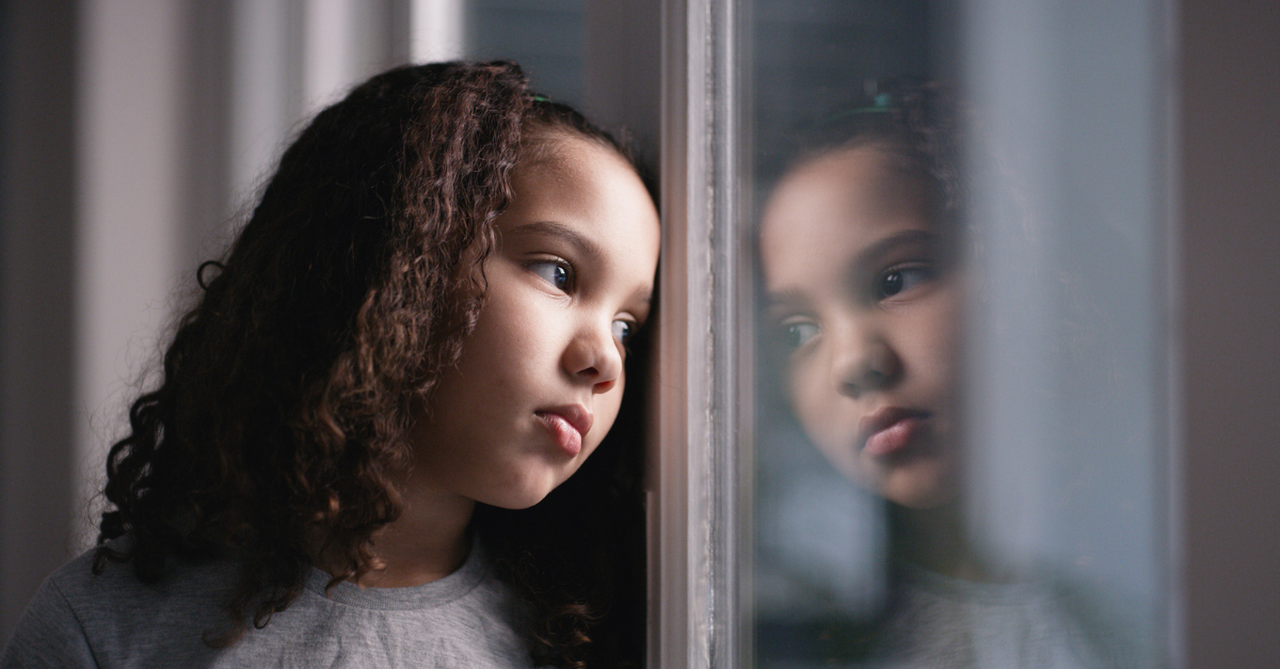6 Ways to Help Your Child through the Loss of a Loved One

Last year was awful. There I said it. I continually relive it like a screenplay on repeat in my mind, struggling for it to make sense, any of it, yet no clarity ever comes. I have no idea how I was sitting over a Chick-fil-A sandwich at lunchtime, laughing with my mom, and by dinnertime, she was lying in a hospital bed on life support. I just can’t wrap my mind around it! She slipped from this world in a matter of hours (on one of my daughter’s birthdays, no less), so it was a bittersweet day, to say the least. Later that day, I had to muster up the courage to buy a cake and balloons while celebrating my sweet girl’s life, all while inwardly mourning the loss of a life I have always known, my sweet momma. My mother was gone, and I immediately felt lost and abandoned.
As shaken as I was by her passing, the most heartbreaking thing to see was how it affected each of my daughters a little differently. The brutal ride of grief took its toll, eventually revealing they also felt lost and abandoned. Their once lively and very involved grandmother whom everyone had grown to love was now gone. The softball stands never sounded so quiet, the dance recitals felt void, and all the baking wasn’t as fun without her loud and bubbly cheers and expert baking skills. Everything shifted and changed - in an instant!
Maybe you understand? Perhaps you, too, have lost a dear loved one and are left picking up the pieces and trying to make sense of things. Oh, sweet friend, let me first extend my most heartfelt condolences. This is never easy, and my words will fall short. I may not fully understand the extent of your loss, but as a parent, I understand the pressure of trying to “keep it all together” for your children. I understand how you desperately want to keep things somewhat normal and help your child through this difficult time. So, I pray that the words offered here speak to you and prompt you to find ways to walk alongside your child and slowly find hope, offering a healing balm o your grieving heart.
1. Give Them (and Yourself) Grace

1. Give Them (and Yourself) Grace
SLIDE 1 OF 7
Grief sure has a sneaky little way of taking guilt and hanging it over our heads. From those moments you blubber cried alone in your car and got caught by your seven-year-old to the time your tiny tot stumbled in on you throwing a rageful fit in the closet due to smells that brought back bitter tears. It’s a lot. Remind yourself that you are going to have good days and bad. And so will your child. Realize that grief will take on many shapes and sizes and can make us react in haste. Grace and space are so important in these times. Allow your child space if needed; if heated emotions flare up, be quick to extend grace and forgiveness. Your child may withdraw or face big emotions, many of which they may have never felt before, so tread lightly. Explain to them that it is normal to feel different and unusual, but no matter what, you are with them, you love them, and they are safe with you. No guilt, just grace.
Bear with each other and forgive one another if any of you has a grievance against someone. Forgive as the Lord forgave you. Colossians 3:13
2. Be Available to Listen

2. Be Available to Listen
SLIDE 2 OF 7
One of the best ways to heal from a loss is to simply talk about it. That said, your child may need a safe sounding board to talk about their feelings and thoughts or just share memories. While they may want to retreat to their friends, their peers may not be able to understand their loss offering advice or empty words that could actually bring more pain. It is important to remind them that most people mean well and want to help but aren’t always sure what to say or how to listen, especially concerning death. Explain to them that while you will also fail from time to time, you are readily available to listen and provide safe support when needed.
My dear brothers and sisters, take note of this: Everyone should be quick to listen, slow to speak and slow to become angry. James 1:19
Photo Credit: ©iStock/Getty Images Plus/Inside Creative House
3. Share Your Own Feelings

3. Share Your Own Feelings
SLIDE 3 OF 7
Unfortunately, loneliness and grief are close companions. Grief will make you believe that nobody cares, much less understands what you are going through, and that all your friends have moved on - without you. The truth is, a profound loss will most likely change some of your relationships. Your child is feeling this change, too. Take time to talk with your child and address the pain and hurt that you are enduring. Then discuss ways you can both approach and settle into this difficult season together. Maybe it is touching base over the dinner table. Maybe it is checking in with them via text or sending a note in their lunch box to school. Let your child know you are also feeling all the hurt surrounding grief, and they are not walking this journey alone. Then once you are both ready, reach back out to those friends and share your feelings with them, too; you might be surprised that they are willing and ready to love on you.
Rejoice with those who rejoice; mourn with those who mourn. Romans 12:15
Photo Credit: ©iStock/Getty Images Plus/valentinrussanov
4. Get Creative

4. Get Creative
SLIDE 4 OF 7
Sometimes the best way to navigate grief is by putting pen to paper. When we were wading through these murky waters after my mom's passing, I gave my daughters a journal to jot down their thoughts and open up their hearts. One used it to draw, the other used it to place down stories and write poems, while one simply let it sit by the side of her bed for six months, but it was there if she needed it. The point is that sometimes our children aren’t sure how to express their feelings, and this invites them into a safe place to share whatever comes to mind. Let them know that this is between them and God, and they are welcome to share if they feel led to, but there is no pressure. Giving them something to store their somewhat messy thoughts, especially in the beginning when things are real and raw, gives them a place to bear it all without feeling judged or misunderstood.
You will seek me and find me when you seek me with all your heart. Jeremiah 29:13
5. Grieve Together

5. Grieve Together
SLIDE 5 OF 7
The word grief used to bother me; I didn’t even like the sound of it. It brought about such a bad connotation and just brought me down. That is until it met me in a new place, bringing on a whole new perspective. One day when grief was hitting me rather hard, my middle daughter came into my bedroom and crawled into bed with me. She snuggled up close, and we just stayed silent for a while until I broke the silence and loudly declared how much I hated grief. Her immediate response was, “Me too.” Something happened in the moment. We looked at each other, and through sobs and mascara-stained checks, we began to laugh. Grief brought us to a place to connect and therefore feel one another’s pain. While grieving with my children, I learned to respect grief and the slow and tender healing it delicately brings. We need that time to grieve with our children. They need to know that while our feelings will come and go, bringing a bunch of highs and lows, we will be able to laugh and experience joy again.
He will wipe every tear from their eyes. There will be no more death or mourning or crying or pain, for the old order of things has passed away. Revelation 21:4
6. Pray with Them

6. Pray with Them
SLIDE 6 OF 7
When we face death and loss, it can either bring us to our knees in prayer, clumsily praying for God to restore and breathe back a little peace, or it can make us flee from the hurt, making us turn away from God. Our children are faced with the decision to turn or flee from God every time grief resurfaces. If you see your child struggling with grief, ask them to pray with you. It doesn’t have to be elaborate; it can be short and sweet, simply asking God for peace. But the action of pausing to pray is powerful. It shows your grieving child that He listens when we bring our hearts before God. If you can’t seem to muster up the words to pray, just sit and be still for a moment, because God knows the nature of your heart. In these delicate moments, we show our children that we must trust God fully and turn to Him.
This is the confidence we have in approaching God: that if we ask anything according to his will, he hears us. 1 John 5:14
My Prayer for You

My Prayer for You
SLIDE 7 OF 7
Heavenly Father,
You are so good to us, and we are so thankful that You are a God of comfort and peace. Today, I lift up the friend that is reading this with a heavy heart, trying to navigate the deep, messy, and murky waters of grief. I ask that You grant them an unexplainable peace that can only come from You and draw them close to feel Your wild and incredible love. Provide ways for this dear parent to reach the needs of their grieving child and tenderly help them feel safe, loved, and secure. I ask that You grant them the release of any guilt they may carry for grief reactions. Give each family member a heart to listen attentively to one another and allow them to share their feelings genuinely and openly. I pray You give them moments to grieve together in order to realize they are not alone on this difficult journey and provide rays of hope filled with outlets to find joy again. Lastly, I pray that You tuck sweet and fond memories within their heart to hold on to in dark times and remind them that they have a purpose and You have a beautiful plan for their lives. I pray all these things in Your Holy and Precious Name.
Amen.
Photo credit: ©GettyImages/milan2099

Originally published August 21, 2023.









